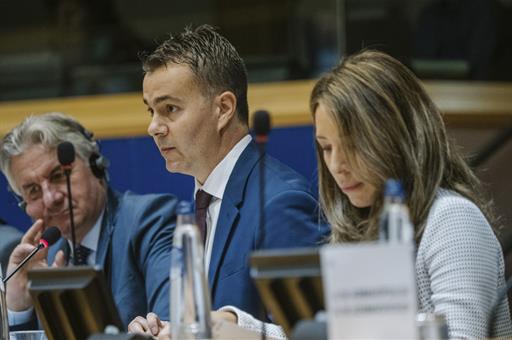Héctor Gómez sets out the priorities of the Spanish Presidency of the EU Council in the European Parliament
News - 2023.9.19
The acting Minister for Industry, Trade and Tourism, Héctor Gómez, has appeared before three European Parliament committees in Brussels to present the priorities in each of the areas of his competence on the occasion of the Spanish Presidency of the Council of the European Union which will run until 31 December.
Héctor Gómez welcomed the importance of these appearances within the framework of the Spanish presidency in order to convey to the 27 European partners the Government's commitment to EU governance and the economic and social development of the continent. For the minister, "this exercise is a necessary accountability to the European public as a whole".
The minister has participated in three EP committees. The first, the Trade Committee (INTA); the second, the Transport and Tourism Committee (TRAN), with the Minister for Transport, Mobility and the Urban Agenda, Raquel Sánchez; and the third, the Industry, Research and Energy Committee (ITRE), with the First Deputy Prime Minister and Minister for Economic Affairs and Digital Transformation, Nadia Calviño.
Trade Committee
In the first committee of the day, the Trade Committee, Minister Gómez pointed out that Europe "has made a firm commitment to digital transformation, ecological transition and fairer economic growth" following the impact of the pandemic and the effects of the Russian invasion of Ukraine. In his speech, the head of the trade portfolio advocated the EU's economic and commercial openness and the defence of free trade as a tool for global progress.
During his appearance, Gómez defended an "ambitious" European trade policy that "swiftly" implements free trade agreements between the EU. In this regard, the minister addressed the need to make clear progress on the agreements already negotiated with Mercosur, Chile and Mexico. "Latin America is a strategic partner for the EU, with which we share values and interests," Gómez recalled, for whom the materialisation of these agreements will mean "weaving solid strategic alliances" with partners similar to the EU.
Gómez also reminded MEPs that the trade policy of the EU-27 "cannot ignore the challenges posed by the governance of economic globalisation", such as issues related to the gender gap, social policy and the development and strengthening of SMEs.
Tourism Committee
In the second committee of the day, the Transport and Tourism committee, where he was joined by Minister Raquel Sánchez, Héctor Gómez focused on the need to give tourism "its own agenda" within the policies of the European Union. An agenda that "pushes for a change of model in the sector towards sustainability".
The Minister for Tourism recalled the three pillars on which the Spanish presidency of the EU pivots in terms of tourism: boosting the skills and training of workers, the balance between tourists and residents in areas of high tourism intensity, and environmental sustainability.
Likewise, and in terms of EU legislation, Gómez expressed his desire to "make progress in the approval" of a Regulation on Short Term Rentals, a "significant step to improve transparency and the fight against fraud" in this sector.
Industry Committee
In the Industry, Research and Energy Committee, the last of the three committees, Héctor Gómez appeared alongside the First Deputy Prime Minister, Nadia Calviño. In his speech, Gómez stressed that one of the main priorities of the European Semester is "the new industrial revolution in the EU, which is committed to improving production processes, making the economy grow and guaranteeing its strategic autonomy". Furthermore, it is essential to "strengthen the autonomy and resilience of supply chains, but also to invest in training and talent so that this new industrial revolution, which is already underway, becomes a reality throughout Europe".
In terms of legislation in the field of industry, Gómez expressed his willingness to reach "consensus on the general approach of the Zero Net Emissions Industry Regulation", a regulation aimed at strengthening the resilience and competitiveness of zero net emissions technologies manufactured in the EU and increasing the security and sustainability of our energy system.
Non official translation





